- Home
- Audrey Niffenegger
Ghostly: Stories Page 7
Ghostly: Stories Read online
Page 7
Mrs Ashby took off her spectacles and rolled up her knitting. ‘If you begin to let yourself imagine things –’
‘Aren’t you in the least anxious?’
‘I never am till I have to be. I wish you’d ring for dinner, my dear. You’ll stay and dine? He’s sure to drop in here on his way home.’
Charlotte called up her own house. No, the maid said, Mr Ashby hadn’t come in and hadn’t telephoned. She would tell him as soon as he came that Mrs Ashby was dining at his mother’s. Charlotte followed her mother-in-law into the dining room and sat with parched throat before her empty plate, while Mrs Ashby dealt calmly and efficiently with a short but carefully prepared repast. ‘You’d better eat something, child, or you’ll be as bad as Kenneth … Yes, a little more asparagus, please, Jane.’
She insisted on Charlotte’s drinking a glass of sherry and nibbling a bit of toast; then they returned to the drawing room, where the fire had been made up, and the cushions in Mrs Ashby’s armchair shaken out and smoothed. How safe and familiar it all looked; and out there, somewhere in the uncertainty and mystery of the night, lurked the answer to the two women’s conjectures, like an indistinguishable figure prowling on the threshold.
At last Charlotte got up and said: ‘I’d better go back. At this hour Kenneth will certainly go straight home.’
Mrs Ashby smiled indulgently. ‘It’s not very late, my dear. It doesn’t take two sparrows long to dine.’
‘It’s after nine.’ Charlotte bent down to kiss her. ‘The fact is, I can’t keep still.’
Mrs Ashby pushed aside her work and rested her two hands on the arms of her chair. ‘I’m going with you,’ she said, helping herself up.
Charlotte protested that it was too late, that it was not necessary, that she would call up as soon as Kenneth came in, but Mrs Ashby had already rung for her maid. She was slightly lame, and stood resting on her stick while her wraps were brought. ‘If Mr Kenneth turns up, tell him he’ll find me at his own house,’ she instructed the maid as the two women got into the taxi which had been summoned. During the short drive Charlotte gave thanks that she was not returning home alone. There was something warm and substantial in the mere fact of Mrs Ashby’s nearness, something that corresponded with the clearness of her eyes and the texture of her fresh firm complexion. As the taxi drew up she laid her hand encouragingly on Charlotte’s. ‘You’ll see; there’ll be a message.’
The door opened at Charlotte’s ring and the two entered. Charlotte’s heart beat excitedly; the stimulus of her mother-in-law’s confidence was beginning to flow through her veins.
‘You’ll see – you’ll see,’ Mrs Ashby repeated.
The maid who opened the door said no, Mr Ashby had not come in, and there had been no message from him.
‘You’re sure the telephone’s not out of order?’ his mother suggested; and the maid said, well, it certainly wasn’t half an hour ago; but she’d just go and ring up to make sure. She disappeared, and Charlotte turned to take off her hat and cloak. As she did so her eyes lit on the hall table, and there lay a grey envelope, her husband’s name faintly traced on it. ‘Oh!’ she cried out, suddenly aware that for the first time in months she had entered her house without wondering if one of the grey letters would be there.
‘What is it, my dear?’ Mrs Ashby asked with a glance of surprise.
Charlotte did not answer. She took up the envelope and stood staring at it as if she could force her gaze to penetrate to what was within. Then an idea occurred to her. She turned and held out the envelope to her mother-in-law.
‘Do you know that writing?’ she asked.
Mrs Ashby took the letter. She had to feel with her other hand for her eyeglasses, and when she had adjusted them she lifted the envelope to the light. ‘Why!’ she exclaimed; and then stopped. Charlotte noticed that the letter shook in her usually firm hand. ‘But this is addressed to Kenneth,’ Mrs Ashby said at length, in a low voice. Her tone seemed to imply that she felt her daughter-in-law’s question to be slightly indiscreet.
‘Yes, but no matter,’ Charlotte spoke with sudden decision. ‘I want to know – do you know the writing?’
Mrs Ashby handed back the letter. ‘No,’ she said distinctly.
The two women had turned into the library. Charlotte switched on the electric light and shut the door. She still held the envelope in her hand.
‘I’m going to open it,’ she announced.
She caught her mother-in-law’s startled glance. ‘But, dearest – a letter not addressed to you? My dear, you can’t!’
‘As if I cared about that – now!’ She continued to look intently at Mrs Ashby. ‘This letter may tell me where Kenneth is.’
Mrs Ashby’s glossy bloom was effaced by a quick pallor; her firm cheeks seemed to shrink and wither. ‘Why should it? What makes you believe – It can’t possibly –’
Charlotte held her eyes steadily on that altered face. ‘Ah, then you do know the writing?’ she flashed back.
‘Know the writing? How should I? With all my son’s correspondents … What I do know is –’ Mrs Ashby broke off and looked at her daughter-in-law entreatingly, almost timidly.
Charlotte caught her by the wrist. ‘Mother! What do you know? Tell me! You must!’
‘That I don’t believe any good ever came of a woman’s opening her husband’s letters behind his back.’
The words sounded to Charlotte’s irritated ears as flat as a phrase culled from a book of moral axioms. She laughed impatiently and dropped her mother-in-law’s wrist. ‘Is that all? No good can come of this letter, opened or unopened. I know that well enough. But whatever ill comes, I mean to find out what’s in it.’ Her hands had been trembling as they held the envelope, but now they grew firm, and her voice also. She still gazed intently at Mrs Ashby. ‘This is the ninth letter addressed in the same hand that has come for Kenneth since we’ve been married. Always these same grey envelopes. I’ve kept count of them because after each one he has been like a man who has had some dreadful shock. It takes him hours to shake off their effect. I’ve told him so. I’ve told him I must know from whom they come, because I can see they’re killing him. He won’t answer my questions; he says he can’t tell me anything about the letters; but last night he promised to go away with me – to get away from them.’
Mrs Ashby, with shaking steps, had gone to one of the armchairs and sat down in it, her head drooping forward on her breast. ‘Ah,’ she murmured.
‘So now you understand –’
‘Did he tell you it was to get away from them?’
‘He said, to get away – to get away. He was sobbing so that he could hardly speak. But I told him I knew that was why.’
‘And what did he say?’
‘He took me in his arms and said he’d go wherever I wanted.’
‘Ah, thank God!’ said Mrs Ashby. There was a silence, during which she continued to sit with bowed head, and eyes averted from her daughter-in-law. At last she looked up and spoke. ‘Are you sure there have been as many as nine?’
‘Perfectly. This is the ninth. I’ve kept count.’
‘And he has absolutely refused to explain?’
‘Absolutely.’
Mrs Ashby spoke through pale contracted lips. ‘When did they begin to come? Do you remember?’
Charlotte laughed again. ‘Remember? The first one came the night we got back from our honeymoon.’
‘All that time?’ Mrs Ashby lifted her head and spoke with sudden energy. ‘Then – yes, open it.’
The words were so unexpected that Charlotte felt the blood in her temples, and her hands began to tremble again. She tried to slip her finger under the flap of the envelope, but it was so tightly stuck that she had to hunt on her husband’s writing table for his ivory letter opener. As she pushed about the familiar objects his own hands had so lately touched, they sent through her the icy chill emanating from the little personal effects of someone newly dead. In the deep silence of the room the tearing of the paper as
she slit the envelope sounded like a human cry. She drew out the sheet and carried it to the lamp.
‘Well?’ Mrs Ashby asked below her breath.
Charlotte did not move or answer. She was bending over the page with wrinkled brows, holding it nearer and nearer to the light. Her sight must be blurred, or else dazzled by the reflection of the lamplight on the smooth surface of the paper, for, strain her eyes as she would, she could discern only a few faint strokes, so faint and faltering as to be nearly undecipherable.
‘I can’t make it out,’ she said.
‘What do you mean, dear?’
‘The writing’s too indistinct … Wait.’
She went back to the table and, sitting down close to Kenneth’s reading lamp, slipped the letter under a magnifying glass. All this time she was aware that her mother-in-law was watching her intently.
‘Well?’ Mrs Ashby breathed.
‘Well, it’s no clearer. I can’t read it.’
‘You mean the paper is an absolute blank?’
‘No, not quite. There is writing on it. I can make out something like “mine” – oh, and “come”. It might be “come”.’
Mrs Ashby stood up abruptly. Her face was even paler than before. She advanced to the table and, resting her two hands on it, drew a deep breath. ‘Let me see,’ she said, as if forcing herself to a hateful effort.
Charlotte felt the contagion of her whiteness. ‘She knows,’ she thought. She pushed the letter across the table. Her mother-in-law lowered her head over it in silence, but without touching it with her pale wrinkled hands.
Charlotte stood watching her as she herself, when she had tried to read the letter, had been watched by Mrs Ashby. The latter fumbled for her glasses, held them to her eyes, and bent still closer to the outspread page, in order, as it seemed, to avoid touching it. The light of the lamp fell directly on her old face, and Charlotte reflected what depths of the unknown may lurk under the clearest and most candid lineaments. She had never seen her mother-in-law’s features express any but simple and sound emotions – cordiality, amusement, a kindly sympathy; now and again a flash of wholesome anger. Now they seemed to wear a look of fear and hatred, of incredulous dismay and almost cringing defiance. It was as if the spirits warring within her had distorted her face to their own likeness. At length she raised her head. ‘I can’t – I can’t,’ she said in a voice of childish distress.
‘You can’t make it out either?’
She shook her head, and Charlotte saw two tears roll down her cheeks.
‘Familiar as the writing is to you?’ Charlotte insisted with twitching lips.
Mrs Ashby did not take up the challenge. ‘I can make out nothing – nothing.’
‘But you do know the writing?’
Mrs Ashby lifted her head timidly; her anxious eyes stole with a glance of apprehension around the quiet familiar room. ‘How can I tell? I was startled at first …’
‘Startled by the resemblance?’
‘Well, I thought –’
‘You’d better say it out, mother! You knew at once it was her writing?’
‘Oh, wait, my dear – wait.’
‘Wait for what?’
Mrs Ashby looked up; her eyes, travelling slowly past Charlotte, were lifted to the blank wall behind her son’s writing table.
Charlotte, following the glance, burst into a shrill laugh of accusation. ‘I needn’t wait any longer! You’ve answered me now! You’re looking straight at the wall where her picture used to hang!’
Mrs Ashby lifted her hand with a murmur of warning. ‘Sh-h.’
‘Oh, you needn’t imagine that anything can ever frighten me again!’ Charlotte cried.
Her mother-in-law still leaned against the table. Her lips moved plaintively. ‘But we’re going mad – we’re both going mad. We both know such things are impossible.’
Her daughter-in-law looked at her with a pitying stare. ‘I’ve known for a long time now that everything was possible.’
‘Even this?’
‘Yes, exactly this.’
‘But this letter – after all, there’s nothing in this letter –’
‘Perhaps there would be to him. How can I tell? I remember his saying to me once that if you were used to a handwriting the faintest stroke of it became legible. Now I see what he meant. He was used to it.’
‘But the few strokes that I can make out are so pale. No one could possibly read that letter.’
Charlotte laughed again. ‘I suppose everything’s pale about a ghost,’ she said stridently.
‘Oh, my child – my child – don’t say it!’
‘Why shouldn’t I say it, when even the bare walls cry it out? What difference does it make if her letters are illegible to you and me? If even you can see her face on that blank wall, why shouldn’t he read her writing on this blank paper? Don’t you see that she’s everywhere in this house, and the closer to him because to everyone else she’s become invisible?’ Charlotte dropped into a chair and covered her face with her hands. A turmoil of sobbing shook her from head to foot. At length a touch on her shoulder made her look up, and she saw her mother-in-law bending over her. Mrs Ashby’s face seemed to have grown still smaller and more wasted, but it had resumed its usual quiet look. Through all her tossing anguish, Charlotte felt the impact of that resolute spirit.
‘Tomorrow – tomorrow. You’ll see. There’ll be some explanation tomorrow.’
Charlotte cut her short. ‘An explanation? Who’s going to give it, I wonder?’
Mrs Ashby drew back and straightened herself heroically. ‘Kenneth himself will,’ she cried out in a strong voice. Charlotte said nothing, and the old woman went on: ‘But meanwhile we must act; we must notify the police. Now, without a moment’s delay. We must do everything – everything.’
Charlotte stood up slowly and stiffly; her joints felt as cramped as an old woman’s. ‘Exactly as if we thought it could do any good to do anything?’
Resolutely Mrs Ashby cried: ‘Yes!’ and Charlotte went up to the telephone and unhooked the receiver.
‘THE BECKONING FAIR ONE’
(GEORGE) OLIVER ONIONS (BRITISH, 1873–1961)
First published in 1911 in the collection Widdershins.
Oliver Onions was a fiction writer and a visual artist who trained at the Royal Academy and designed the dust jackets for some of his books’ first editions. He is best remembered for his ghost stories, but also wrote a number of morose realistic novels and stories. ‘The Beckoning Fair One’ can be read as an attentive study of a psychotic breakdown or as a very effective ghost story. It is surely a classic in the literature of writer’s block.
THE BECKONING FAIR ONE
Oliver Onions
1
The three or four ‘To Let’ boards had stood within the low paling as long as the inhabitants of the little triangular ‘Square’ could remember, and if they had ever been vertical it was a very long time ago. They now overhung the palings each at its own angle, and resembled nothing so much as a row of wooden choppers, ever in the act of falling upon some passer-by, yet never cutting off a tenant for the old house from the stream of his fellows. Not that there was ever any great ‘stream’ through the square; the stream passed a furlong and more away, beyond the intricacy of tenements and alleys and byways that had sprung up since the old house had been built, hemming it in completely; and probably the house itself was only suffered to stand pending the falling-in of a lease or two, when doubtless a clearance would be made of the whole neighbourhood.
It was of bloomy old red brick, and built into its walls were the crowns and clasped hands and other insignia of insurance companies long since defunct. The children of the secluded square had swung upon the low gate at the end of the entrance-alley until little more than the solid top bar of it remained, and the alley itself ran past boarded basement windows on which tramps had chalked their cryptic marks. The path was washed and worn uneven by the spilling of water from the eaves of the encroaching next house,
and cats and dogs had made the approach their own. The chances of a tenant did not seem such as to warrant the keeping of the ‘To Let’ boards in a state of legibility and repair, and as a matter of fact they were not so kept.
For six months Oleron had passed the old place twice a day or oftener, on his way from his lodgings to the room, ten minutes’ walk away, he had taken to work in; and for six months no hatchet-like notice-board had fallen across his path. This might have been due to the fact that he usually took the other side of the square. But he chanced one morning to take the side that ran past the broken gate and the rain-worn entrance-alley, and to pause before one of the inclined boards. The board bore, besides the agent’s name, the announcement, written apparently about the time of Oleron’s own early youth, that the key was to be had at Number Six.
Now Oleron was already paying, for his separate bedroom and workroom, more than an author who, without private means, habitually disregards his public, can afford; and he was paying in addition a small rent for the storage of the greater part of his grandmother’s furniture. Moreover, it invariably happened that the book he wished to read in bed was at his working-quarters half a mile and more away, while the note or letter he had sudden need of during the day was as likely as not to be in the pocket of another coat hanging behind his bedroom door. And there were other inconveniences m having a divided domicile. Therefore Oleron, brought suddenly up by the hatchet-like notice-board, looked first down through some scanty privet-bushes at the boarded basement windows, then up at the blank and grimy windows of the first floor, and so up to the second floor and the flat stone coping of the leads. He stood for a minute thumbing his lean and shaven jaw; then, with another glance at the board, he walked slowly across the square to Number Six.
He knocked, and waited for two or three minutes, but, although the door stood open, received no answer. He was knocking again when a long-nosed man in shirt-sleeves appeared.
‘I was arsking a blessing on our food,’ he said in severe explanation.

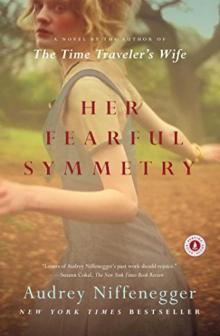 Her Fearful Symmetry
Her Fearful Symmetry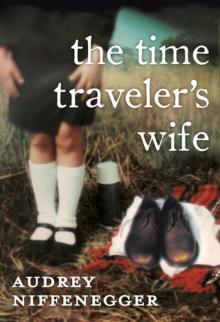 The Time Traveler's Wife
The Time Traveler's Wife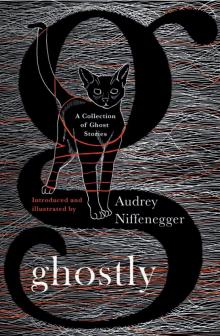 Ghostly: Stories
Ghostly: Stories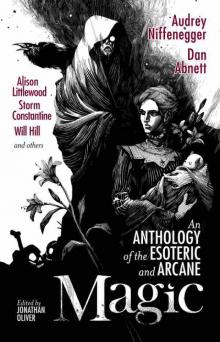 Magic
Magic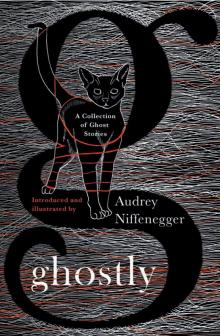 Ghostly
Ghostly